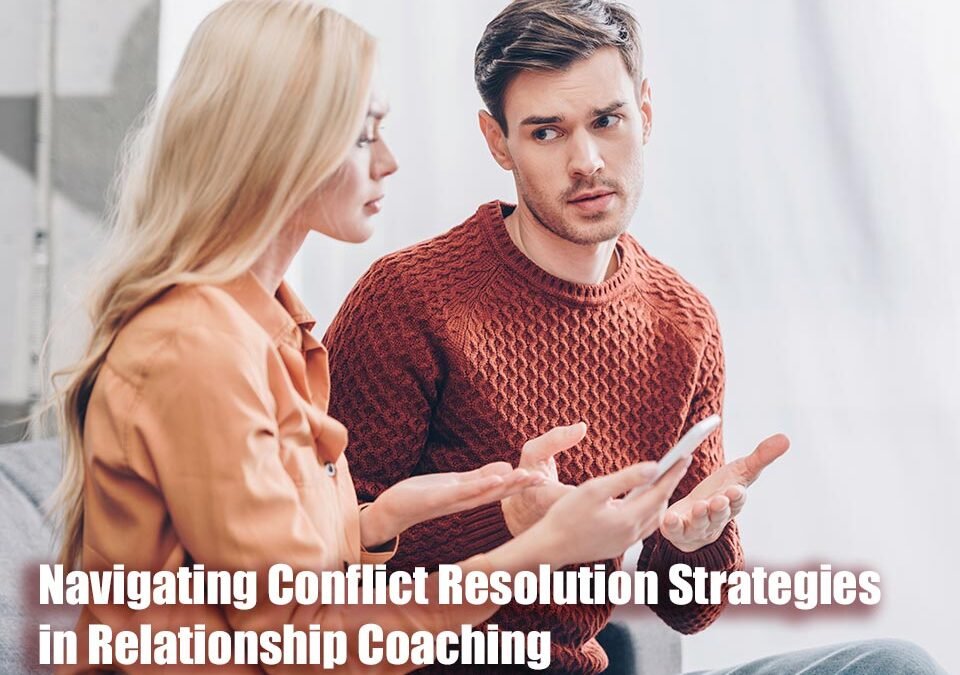
Thriving After Divorce: Support and Guidance from Relationship Specialist Iryna Wood
25 March 2024
Mastering Self-Discovery: A Guide to Coaching Through Meditation.
28 March 2024If you’ve found my article titled “Navigating Conflict Resolution Strategies in Relationship Coaching,” you’re likely experiencing conscious or unconscious conflict with your partner or within yourself. Why do I phrase it this way? Typically, whatever hinders you from speaking honestly and directly to your partner is often linked to a fear of relationship loss or past trauma. For instance, I fell for a guy with three kids but avoided discussing children because I feared the truth – maybe he doesn’t want more kids. This avoidance leads to living in an illusion, potentially wasting precious time. Or, consider desiring something like a Chanel bag but never expressing this wish to avoid seeming being after money, based on past experiences with ex-boyfriend who accused the girl be materialistic. And for her it’s a problematic question of self-value and self-appreciation. This is essentially lying to yourself and your partner about your true desires and values, thus creating an unspoken, hidden conflict. It’s frightening because it remains unrecognized – your partner can’t read your mind.
Why Shouldn’t You Fear Open Conflict?
In the best-case scenario, open conflict in couples leads to better understanding and spiritual growth within your relationship, making it stronger. In another positive outcome, you may realize you’re not right for each other, allowing both of you the chance to find happiness separately. Withholding this opportunity is a form of greed.
Conflict Resolution in Loving Relationships
Assuming you’re meant to be together and you both love each other, conflicts will inevitably arise. It happens sometimes to everybody. How can you address them and make peace naturally?
Always remember during conversations that you love each other and share the common goal of being together! This is the key. Holding onto this positive thought will smooth out discussions.
Understanding Differences
Give each other time to process the conflict, recognizing that everyone is different. Astrology can be a helpful tool here, shedding light on individual temperaments and coping mechanisms. Some might need physical activities like boxing to relieve stress, while others might require quiet time alone.
The Art of Honest Conversation
When the right moment for a discussion arises, be honest. Share your feelings from your perspective: “I felt ignored,” “I got upset,” “I felt lost,” etc. Everyone experiences events differently due to unique backgrounds and experiences. You can’t deny someone’s feelings as they’re personal and valid.
Explain the root of your reactions. For example, “I know you didn’t mean to upset me, but when you raised your voice, it reminded me of past traumas with my father. Please be mindful of your tone next time; I love you, and it’s very painful for me.”
Active Listening and Empathy
Active listening is crucial – fully concentrate, understand, respond, and remember what’s said. Embrace empathy to understand your partner’s perspective, which can transform conflicts into growth opportunities. Put yourself in smb’s shoes helps to see the situation fully.
Identifying Core Issues
Conflicts often arise from unmet needs, unexpressed emotions, or miscommunications. Identifying the real stressor in the relationship is crucial. Maybe ongoing work stress or fear about a family member’s health is the real issue. When we are exhausted, we usually take out stress on the closet people around you. Be brave to face the core challenge, then you will consider it if conflict will happen on repeat.
Effective Communication
Avoid screaming, disrespect, or interrupting. If something is unclear, calmly ask your partner to explain. There couple in my practice who have language barriers and simply the same words could be taken in a different way under different mood.
Developing Long-term Strategies
Decide how you’ll handle similar situations in the future if they happen. And trust that your partner didn’t want to hurt you as if he/she did then probably this person was full of pain. Happy people don’t try to hurt others. Only you decide to which category you want to belong to!

Trust the Process!
– Iryna Wood , Relationship Specialist with Astrological Expertise




